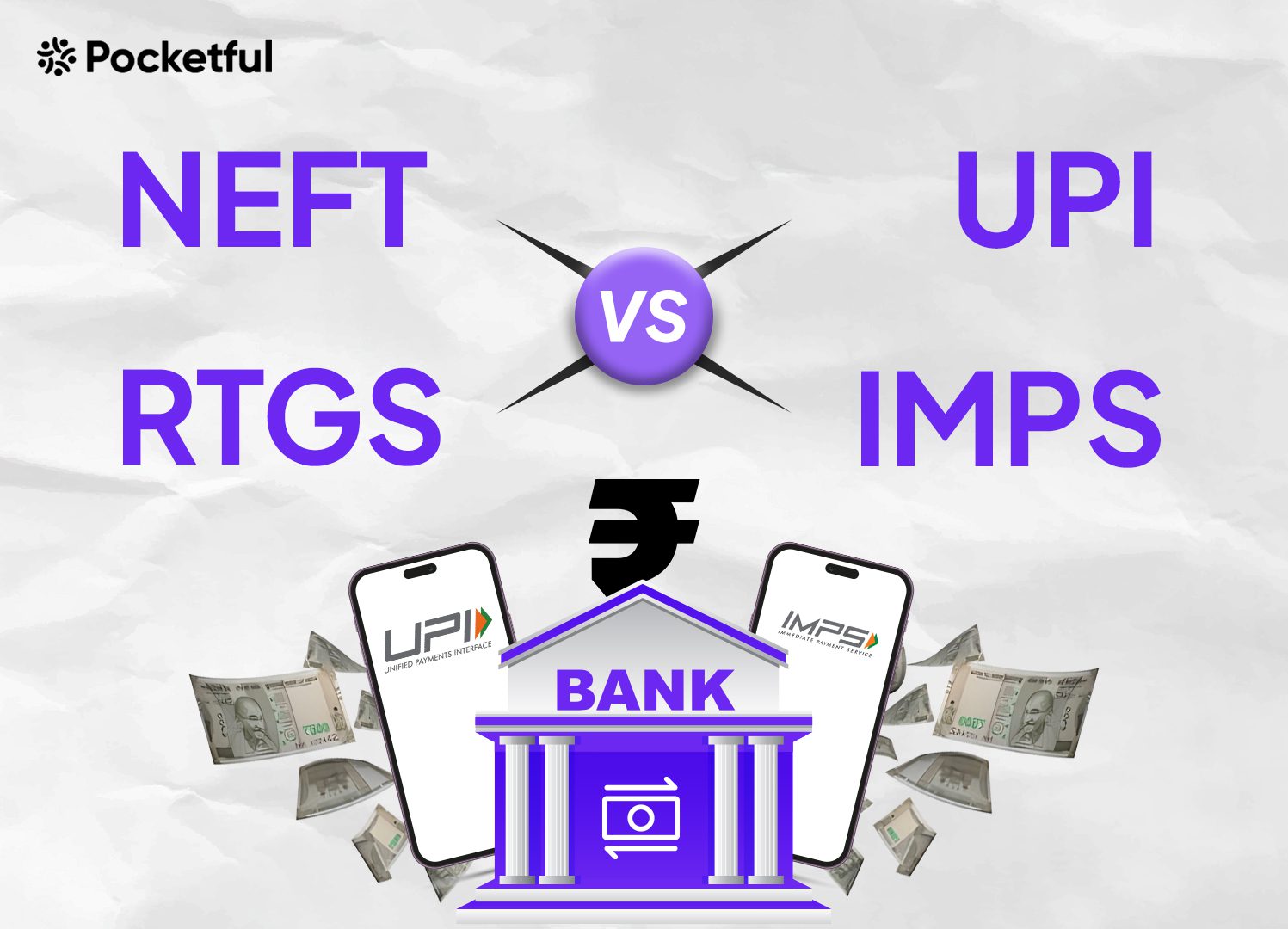| Type | Description | Contributor | Date |
|---|---|---|---|
| Post created | Pocketful Team | Mar-13-24 | |
| Add new links | Nisha | Mar-01-25 |

- Blog
- neft vs rtgs vs upi vs imps a comparative study
NEFT vs RTGS vs UPI vs IMPS: A Comparative Study

In today’s digital era, electronic fund transfers have become the norm, revolutionizing how we transact money. Multiple options, such as RTGS, NEFT, UPI, and IMPS, are available. Let us delve into the blog better to understand these options.
NEFT: An Overview
It stands for National Electronic Funds Transfers and is a RBI-governed funds transfer method. NEFT started in November 2005 and is a safe and secure method of transferring small amounts of money.
Features
- Fees and Charges: Online NEFT transactions are free of charge and offline transfers cost up to ₹50 in charges.
- Processing Time: Processing time is in under 2 hours. In some cases, it may also take up to 12 hours.
- Maximum Limit: There is no maximum limit per day for NEFT transactions.

RTGS: An Overview
It stands for Real-time Gross Settlement and is used to transfer higher amounts. RTGS ensures that the funds are transferred securely and without dependence on other transactions, thus minimizing risk.
Features
- Fees and Charges: RTGS online transfers do not have any levied charges.
- Processing Time: RTGS is the fastest method to transfer higher-value amounts, and the transaction is settled in real-time, under 30 minutes.
- Maximum Limit: The Reserve Bank of India (RBI) has not set any maximum transaction limit.
UPI: An Overview
It was launched in 2016 by the National Payments Corporation of India (NPCI) and stands for Unified Payments Interface. The unique feature of UPI is the ease of transferring money, this lets you send money from your bank account to another by simply entering someone’s phone number, UPI ID, or scanning a QR code. This fund transfer facility is available through your mobile 24*7.
Features
- Fees & Charges: UPI payments service is free and does not charge any transaction fees.
- Processing time: UPI is an instant payment and transfer method.
- Maximum Limit: UPI’s maximum transaction limit per day is 1 Lakh.

IMPS: An Overview
It stands for Immediate Payments Service and was first established by NPCI in 2010. An IMPS funds transfer is a better fit for you than UPI as it allows immediate transfer of amounts up to 5 Lakhs.
Features
- Fees & Charges: IMPS transfer fees can range from ₹2.5 to ₹25 + GST depending on the amount value and choice of bank.
- Processing time: IMPS transfers amount usually within 30 minutes.
- Maximum Limit per day: The transaction limit of IMPS is 5 Lakhs.
Read Also: XIRR Vs CAGR: Investment Return Metrics
Comparison Chart
| Basis | NEFT | RTGS | UPI | IMPS |
|---|---|---|---|---|
| Minimum Transfer Limit | No minimum limit | ₹2 Lakh | No minimum limit | No minimum limit |
| Maximum Transfer Limit | No upper limits (max. ₹50,000 per transaction) | No limit | ₹1 Lakh | ₹5 Lakhs |
| Time Taken | Up to 12 hours (usually within 2 hours) | Real-time (within 30 Minutes) | Instant | Real-time (within 30 Minutes) |
| Service Availability | Online + Offline | Online + Offline | Online + Offline | Online + Offline (chargeable) |
Security | Safe, backed by RBI | Safe, backed by RBI | Safe, backed by NPCI | Safe, backed by NPCI |
| Service Fees | No charges on online NEFT transactionsOffline NEFT transactions are charging between ₹2.5 to ₹50 | No charges for online transactionsFor offline: ₹2L to 5L transaction: up to ₹25 applicable₹5L & above transaction: ₹25 to ₹50 applicable | Free of cost | ₹2.5 to ₹25 (varies from bank to bank) |
| GST charges | GST charges are applicable | No GST charges for online RTGS transaction₹15 + GST is charged for offline RTGS transaction | No charges | GST charges are levied |
| Service Availability during Bank Holidays | Available | Available | Available | Available |
| Suitability | Suitable for loan repayment and credit card payments | Suitable for transactions exceeding ₹2 lakhs. | Suitable for instant transfers upto ₹1 lakh | Suitable for transactions ranging between ₹1 lakhs to ₹2 lakhs |
| Operated by | RBI | RBI | NPCI | NPCI |
Charges
Let’s have a look at which one is cheaper NEFT vs RTGS vs UPI vs IMPS:
| Amount | NEFT | RTGS | UPI | IMPS |
|---|---|---|---|---|
| Below 2 Lakhs | Free | Not Applicable | Free | ₹2.5 to ₹15 + GST charges |
| 2 Lakhs to 5 Lakhs | ₹25 to ₹30 + GST charges if applicable | Free of cost | Not Applicable | ₹2.5 to ₹15 + GST charges |
| 5 Lakhs & above | ₹25 to ₹50 + GST charges if applicable | maximum ₹50 + GST charges | Not Applicable | Not applicable |
Read Also: SIP in Stocks vs SIP in Mutual funds?
Conclusion
In conclusion, NEFT, RTGS, UPI, and IMPS are distinct electronic fund transfer systems with varying features and benefits. NEFT is suitable for small transactions, RTGS for higher amounts, IMPS for instant transfers up to 5 Lakhs, and UPI for quick transfers up to 1 Lakh without charges. Each method caters to different needs and preferences in online transactions.
| S.NO. | Check Out These Interesting Posts You Might Enjoy! |
|---|---|
| 1 | Liquid Funds Vs Ultra Short Fund: Which One Should You Choose? |
| 2 | Active or Passive Mutual Funds: Which Is Better? |
| 3 | SIP vs Lump Sum: Which is Better? |
| 4 | Mutual Fund vs PMS: Which is Better? |
| 5 | Multi-Cap Vs Flexi-Cap Mutual Funds? Which Is Better |
Frequently Asked Questions (FAQs)
What is the minimum amount for an IMPS transfer?
The amount transferable through an IMPS can be as low as Re.1.
What is the limit of IMPS in Indian bank?
Account holders can transfer up to Rs. 2 lakh through IMPS in a day.
Is RTGS mode of payment safe?
RTGS is a highly safe and secure mode of payment which is monitored by the RBI. It is even more secure as it is used majorly for money transfers of higher amounts.
Which is better, NEFT or UPI?
It depends on the user’s preferences and amount of transfer. While UPI transactions are processed instantly, NEFT transactions may take upto 2 hours to process.
Is IMPS a better mode of transfer than NEFT and RTGS?
IMPS allows immediate transfer of funds and this service can be accessed even on bank/public holidays. That is why this service is often considered better than NEFT and RTGS.
Disclaimer
The securities, funds, and strategies discussed in this blog are provided for informational purposes only. They do not represent endorsements or recommendations. Investors should conduct their own research and seek professional advice before making any investment decisions.